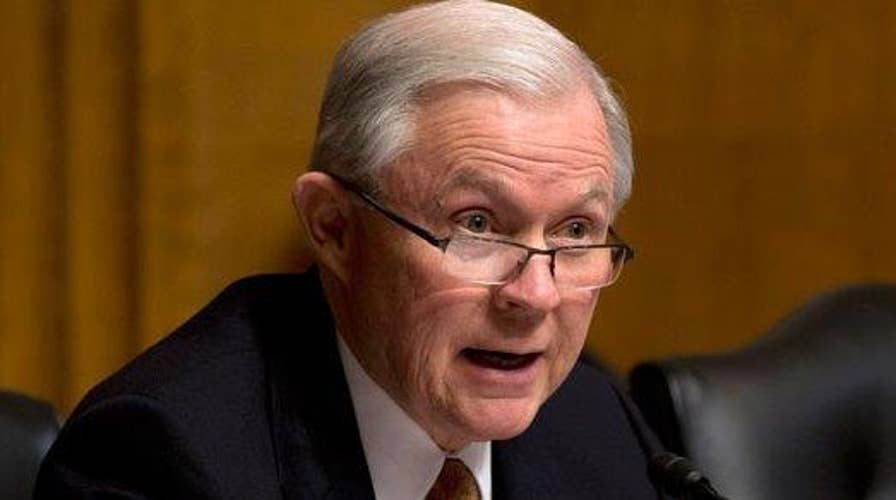Sen. Jeff Sessions won confirmation Wednesday evening to become the next attorney general of the United States, capping a Senate fight so contentious that one of the nominee’s biggest critics was forced by majority Republicans to sit out the last leg of the debate.
The Senate narrowly approved the Alabama Republican’s nomination on a 52-47 vote, the latest in a series of confirmation votes that have been dragged out amid Democratic protests. One Democrat, Joe Manchin of West Virginia, joined Republicans in voting to confirm Sessions. Sessions himself voted present.
In his farewell address Wednesday evening, Sessions urged his erstwhile colleagues to get along better following days of bruising debate.
"We need latitude in our relationships," Sessions said. "Denigrating people who disagree with us is not a healthy trend for our body."
President Trump has accused Democrats of obstructing the confirmation process, though the Senate will turn next to votes on the president’s picks to lead the health and treasury departments.
Sessions became just the sixth Cabinet nominee approved by the Senate, joining Trump's choices for Defense, Homeland Security, Education, Transportation and State.
Wednesday’s vote came after a rowdy overnight session during which Sen. Elizabeth Warren, D-Mass., was formally chastised for allegedly impugning Sessions’ integrity on the floor.
Warren had read a letter authored in 1986 by Coretta Scott King, who was against Sessions’ nomination at the time to the federal bench, arguing he used the power of his office to “chill” black voting rights. Warren also quoted the late Sen. Ted Kennedy, D-Mass., who originally had entered King’s letter into the record, describing Sessions as “disgraceful.”
GOP Senate leaders said Warren had violated Senate rules and should lose her speaking privileges. In a remarkable scene, the Senate then voted 49-43 to suspend Warren’s speaking privileges for the rest of the nomination process – the first time the Senate has imposed such a punishment in decades.
Democrats had repeatedly contended that Sessions is too close to Trump, too harsh on immigrants, and weak on civil rights for minorities, immigrants, gay people and women. Sessions was a prominent early backer of Trump, a supporter of his hard line on illegal immigration and joined Trump's advocacy of a wall along the U.S.-Mexico border.
"There is simply nothing in Senator Sessions' testimony before the Judiciary Committee that gives me confidence that he would be willing to stand up to the president," said Sen. Pat Leahy, D-Vt. "He has instead demonstrated only blind allegiance."
Republicans argued Sessions has demonstrated over a long career in public service, including two decades in the Senate, that he possesses integrity, honesty, and is committed to justice and the rule of law.
"He's honest. He's fair. He's been a friend to many of us, on both sides of the aisle," Senate Majority Leader Mitch McConnell, R-Ky., said on Wednesday. "It's been tough to watch all this good man has been put through in recent weeks. This is a well-qualified colleague with a deep reverence for the law. He believes strongly in the equal application of it to everyone."
The debate had been intensified by Sessions’ nomination to a federal judgeship three decades ago, which was rejected by the Senate Judiciary Committee after it was alleged that as a federal prosecutor he had called a black attorney "boy" and had said organizations like the NAACP and the American Civil Liberties Union were un-American.
At his hearing last month, Sessions said he had never harbored racial animus and claimed he had been falsely caricatured.
Before Wednesday's vote, Sen. Tim Scott, R-S.C., the Senate's lone black Republican, offered a personal and passionate defense of Sessions. He spoke of his personal experiences in introducing the Alabama Republican to African-American pastors at a racial forum in Charleston.
And he read the statements of black Alabama Democrats vouching for Sessions, who as attorney general will be the nation's top law enforcement official.
Scott said the South is still working through racial differences and said "Jeff Sessions has earned my support and I will hold him accountable if and when we disagree."
Scott read messages in which he was called an "Uncle Tom" -- and worse -- and said that "as I read through some of the comments of my friends on the left, you will wonder if I ever had an experience as a black person in America."
"I just wish that my friends who call themselves liberals would want tolerance for all Americans."
Fox News’ Chad Pergram and The Associated Press contributed to this report.











































